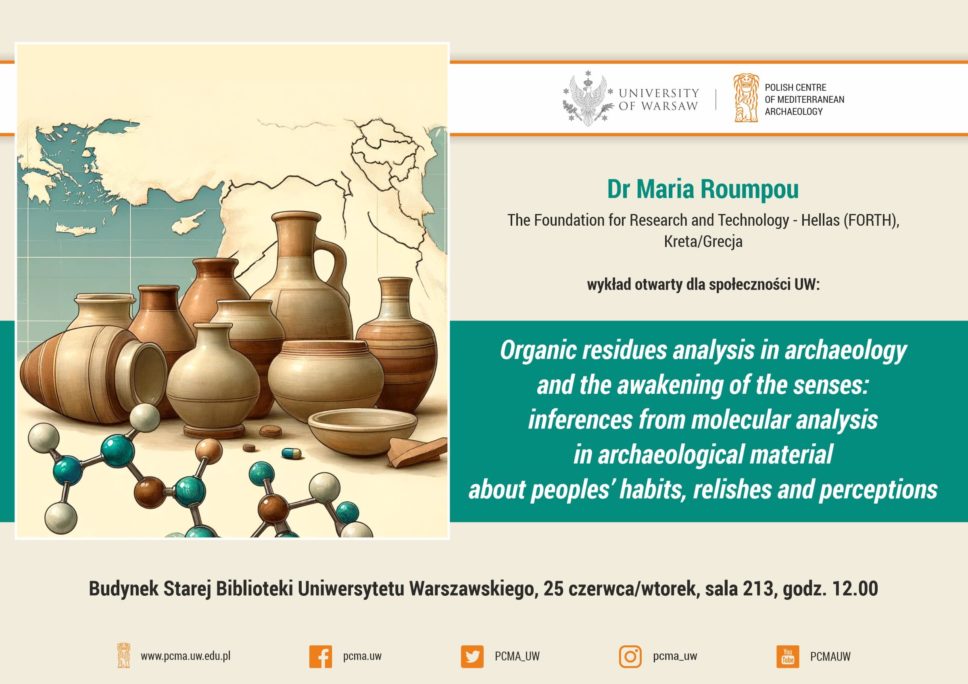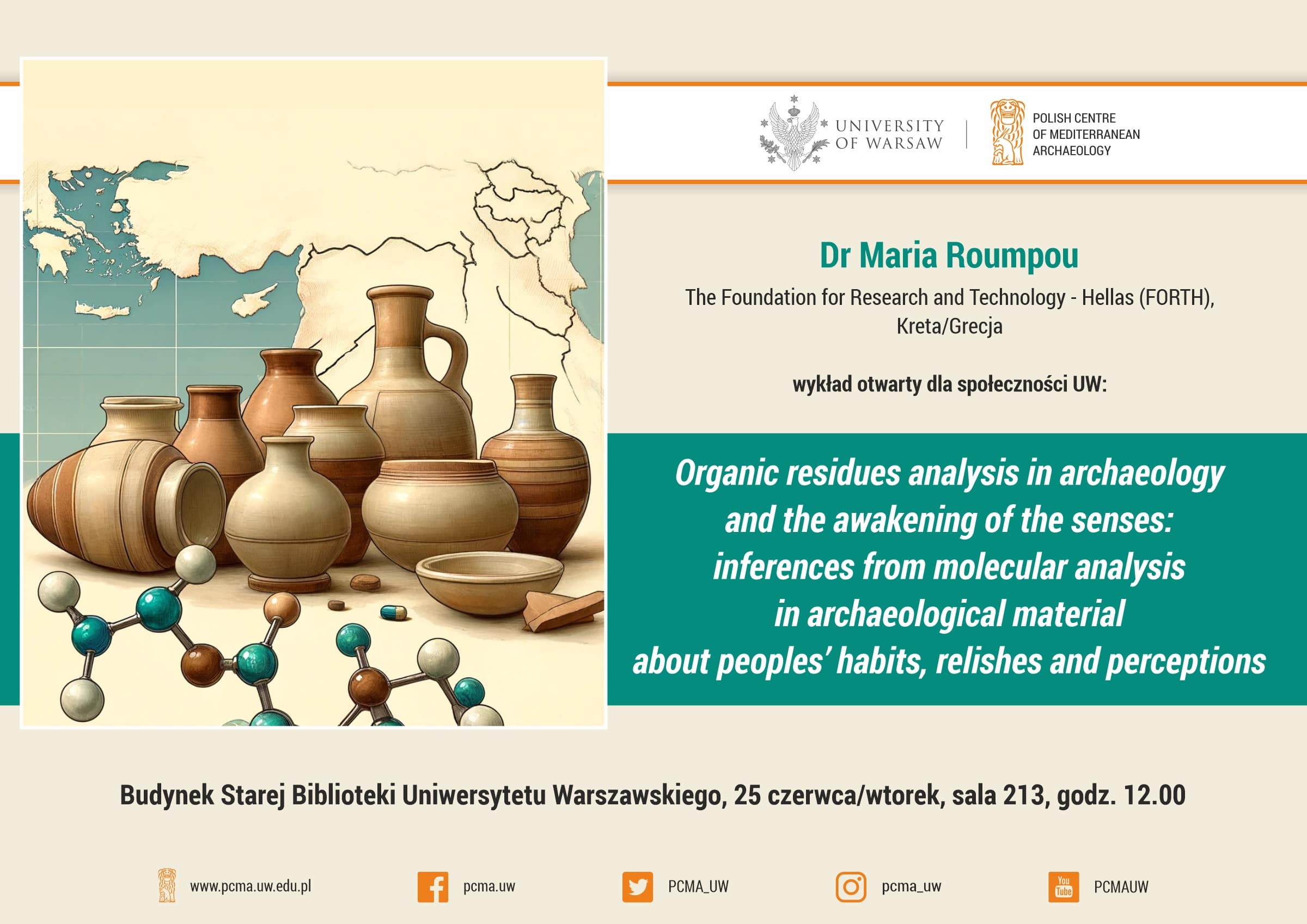The Polish Centre of Mediterranean Archaeology, University of Warsaw will host Dr. Maria Roumpou from the Foundation for Research and Technology – Hellas (FORTH), who is a specialist in the use of archaeometry and scientific research methods in archaeological material remains’ analysis. Her visit to the University of Warsaw is part of the Excellence Initiative–Research University “Mentoring Programme” and will involve an open lecture and workshops for a ceramology working group coordinated by Dr. Urszula Wicenciak-Núñez from the PCMA UW.
Dr. Maria Roumpou will present a lecture: “Organic residues analysis in archaeology and the awakening of the senses: inferences from molecular analysis in archaeological material about peoples’ habits, relishes, and perceptions.” It will be held on June 25th, 2024, at 12:00 pm in room 213 of the Old Library Building at the University of Warsaw’s Main Campus. The lecture is open to the public.
Abstract: “The past thirty years biomolecular archaeology has witnessed great development and organic residue analysis in archaeological artefacts has become an integral part of archaeological research. People perceive the world through a complex web of social and cultural values and beliefs, using their senses to conceive, adapt and cope with the environment. The quest for natural substances that can fulfill a widening spectrum of needs (not always purely biological) is continuous and the traces that might have been preserved in containers made of clay or other durable materials can shed light on many aspects of life in antiquity. Advancements in analytical instrumentation have allowed the identification of a range of commodities either as foodcrusts or visible residues on the surface of the artefacts (Chen et al. 2024, Courel et al. 2021, Bondetti et al. 2021) or more frequently as organic substances absorbed into, and subsequently extracted from the inorganic matrix (Lundy et al. 2023, Bonaduce et al. 2017, Rageot et al. 2016). Therefore, it has become evident that integrated studies are required to successfully tackle complex research question, while the selection of an appropriate analytical methodology must be based on the archaeological information sought and the material analysed.
Recent research efforts concerned with the study of archaeological ceramic vessels took place mainly in north-western Europe, because of better anticipated preservation of organic molecules due to favourable environmental conditions, but also because of the prominence of use of natural resources and the importance of artisanal activities and trade, as well as of the everyday habits in the archaeological dialogue, especially amongst prehistorians. In contrast, no large-scale systematic study has been carried out on vessels that are not related with cooking or trade from the south-eastern Mediterranean. The analysis of organic residues in pottery of the wider region (eastern Mediterranean and Middle East) can provide important information both in relation to the actual use of pottery and the functional correlation of pottery production, the shape and content of pottery, as well as in the approach of socio-political parameters reflected in the material culture of the period.
Characteristically, we mention the very encouraging results of the first phase of pottery study dating to the Neolithic and Chalcolithic periods from Cyprus (Roumpou et al. 2021), analysis of Late Bronze Age storage and transport vessels (Steele and Stern 2017), investigation of use residues in a range of vessel types from Israel dating from the Neolithic to the end of the Chalcolithic period (Chasan et al. 2022), notwithstanding the dearth of information regarding later periods. The Foundation for Research and Technology in Crete has supported the realisation of inter- disciplinary projects at the intersection of natural sciences and archaeology in Europe. The diversity of research and the central infrastructure of the Foundation in collaboration with the University of Crete provide the opportunities for interdisciplinary research in many areas, including molecular analyses in archaeological material.”
Dr. Maria Roumpou, (The Foundation for Research and Technology – Hellas (FORTH), Crete/Greece) is an archaeologist specializing in the use of archaeometry and scientific research methods to analyze archaeological material remains. She holds a Ph. in scientific methods in archaeology from the University of Bradford. Her areas of interest include Aegean archaeology, the application of scientific methods in archaeology, archaeological chemistry, and molecular analysis of archaeological materials. She has participated in several research projects where she focused on the analysis of residual organic remains in archaeological ceramics, including those at Mycenae, Toumba in Thessaloniki, the Cave of Drakaina on Kefalonia, Akrotiri on Thera, Ayia Sotira in Nemea, and Thebes. In addition, she is co-director of the Northern Greek Storage Project together with Dr. Despina Margomenou and a contractor in the Beyond Oikos: outdoor spaces, daily life and sociality in Neolithic Greece (BONDS). Dr. Roumpou maintains an ongoing collaboration with the Institute of Materials Science/Archaeometry at the National Research Center “Demokritos” and with the Department of Dietetics and Nutrition at Harokopio University in Athens.
The objective of Action I.1.1/IV.1.1 “Mentoring Programme” is to provide opportunities for researchers from the University of Warsaw to join teams who are implementing ground-breaking projects by enabling the formation of an international network of contacts with scientists from universities from other countries, including outstanding researchers of worldwide renown.
The team of the project “Molecular Characterization of Organic Residues in Ceramic Vessels and Challenges in Detecting and Identifying Organic Remains from Stone Vessels from the Eastern Mediterranean Basin, the Middle East, and Black Sea Countries: A Historical and Geographical Perspective” involves six members from the PCMA UW, the Faculty of Archaeology UW and the Faculty of History UW: Ewa Czyżewska-Zalewska, Dr. Mateusz Iskra, Dr. Paulina Komar, Dr. Łukasz Rutkowski, Dr. Anna Smogorzewska, Dr. Urszula Wicenciak-Núñez.


